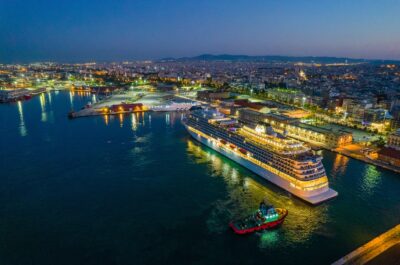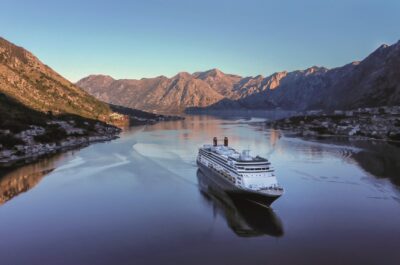Latest measures from operational safety review focus on lifejacket stowage, storage of heavy objects and bridge operating procedures; new policies exceed existing international regulatory requirements.
WASHINGTON – On behalf of the global cruise industry, Cruise Lines International Association (CLIA) and the European Cruise Council (ECC) announced that the cruise industry has adopted three additional safety policies. These policies address issues related to lifejacket stowage on newly-constructed ships, the securing of heavy objects onboard ships, and the synchronization of bridge operating procedures within commonly owned and operated fleets. These policies exceed current international regulatory requirements and are further outcomes of the Cruise Industry Operational Safety Review, which was launched in January 2012.
The Location of Lifejacket Stowage policy complements the existing Excess Lifejackets policy under which oceangoing cruise lines of CLIA and the ECC carry additional adult lifejackets onboard so that the number of lifejackets carried far exceeds the number of persons actually onboard the ship. Under this new policy lifejackets equal to or greater than the number required by international regulations and the ship’s flag State are to be stowed in close proximity to either muster stations or lifeboat embarkations points on newly-constructed ships. Consequently, lifejackets will be readily accessible by crewmembers for distribution to passengers in the event of an emergency. This policy further enhances shipboard safety as passengers will have even greater access to lifejackets in the event of an emergency.
The Securing Heavy Objects policy provides that oceangoing member lines of CLIA and the ECC have procedures in their Safety Management Systems to secure heavy objects either permanently, when not in use, or during severe weather. Heavy objects, if not properly secured, have the potential to cause injury. This policy was developed to further safeguard passenger and crew well-being. Member lines are to perform ship-wide inspections to ensure heavy objects are properly secured. For example, heavy objects include items such as pianos, televisions, treadmills and laundry equipment. Full implementation of this policy is underway and is to be completed in the coming months.
The Harmonization of Bridge Procedures policy helps to enhance operational safety within CLIA and ECC oceangoing member lines by achieving consistency in operating procedures within individual companies and among brands within a commonly owned and operated fleet. As members of a ship’s bridge team often rotate among different ships, the utilization of consistent bridge procedures will improve communications, not only onboard the ship but within each company and thereby provide for enhanced operational safety.
“These three new policies build upon the other seven wide-ranging policies that the global cruise industry has proactively adopted since January of this year and are helping improve the safety of passengers and crew, which is our industry’s top priority,” said Christine Duffy, president and CEO of CLIA. “We look forward to continuing our ongoing collaboration with numerous stakeholders across the globe to further enhance our exceptionally strong safety record.”
“The broad range of these three new policies is representative of the truly holistic nature of the operational safety review and demonstrates that safety improvements are being made wherever there is scope to do so,” said Manfredi Lefebvre d’Ovidio, ECC Chairman. “Furthermore, these policies again highlight our Members’ commitment to harmonising safety practices across the industry and are reflective of the cruise lines’ willingness to adopt and share best practice wherever possible.“
The Cruise Industry Operational Safety Review receives advice and input from a panel of outside maritime and safety experts. These individuals are evaluating suggested policy improvements as part of the cruise industry’s continuous efforts to review and improve safety measures by developing comprehensive best practices for industry-wide implementation and, ultimately, formal submission to the International Maritime Organization, as appropriate. These policies will be reported to the IMO’s Maritime Safety Committee in late November, 2012 for consideration at its next session in May 2013.
CLIA announced the launch of the Review on January 27, 2012. As part of the Review, in February, the global cruise industry instituted a new policy requiring mandatory emergency muster drills for embarking passengers prior to departure from port. In March, the industry put forth recommendations to the IMO supporting enhanced reporting requirements to improve the consistency and transparency of marine casualty data. In April, it announced three policies addressing issues related to passage planning, personnel access to the bridge and lifejackets. In June, the global cruise industry announced policies related to the recording of passenger nationality and the common elements of musters and emergency instructions. In September the industry announced a policy regarding lifeboat loading for crew training purposes. Additional best practices and policies developed through the Cruise Industry Operational Safety Review will be announced and implemented on an ongoing basis.
Vicky is the co-founder of TravelDailyNews Media Network where she is the Editor-in Chief. She is also responsible for the daily operation and the financial policy. She holds a Bachelor's degree in Tourism Business Administration from the Technical University of Athens and a Master in Business Administration (MBA) from the University of Wales.
She has many years of both academic and industrial experience within the travel industry. She has written/edited numerous articles in various tourism magazines.































































































































































































































